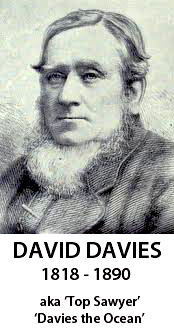![]() This week’s tale comes from Powys. It’s an old story with a modern twist. Local farmers and others up against those with more money and political clout, with the twist being the environmental angle.
This week’s tale comes from Powys. It’s an old story with a modern twist. Local farmers and others up against those with more money and political clout, with the twist being the environmental angle.
The Crown Estate is involved, and we also encounter that ultimate expression of the environmental scam – ‘natural capital’, which puts a price tag (in the form of grants and subsidies expected) on every blade of grass.
◊
ON THE BLACK HILL
The area we’re going to focus on is roughly halfway between Builth and the border, an area containing Glascwm Hill (pinned) and the Black Hill. There are quite a few grouse butts in the vicinity.
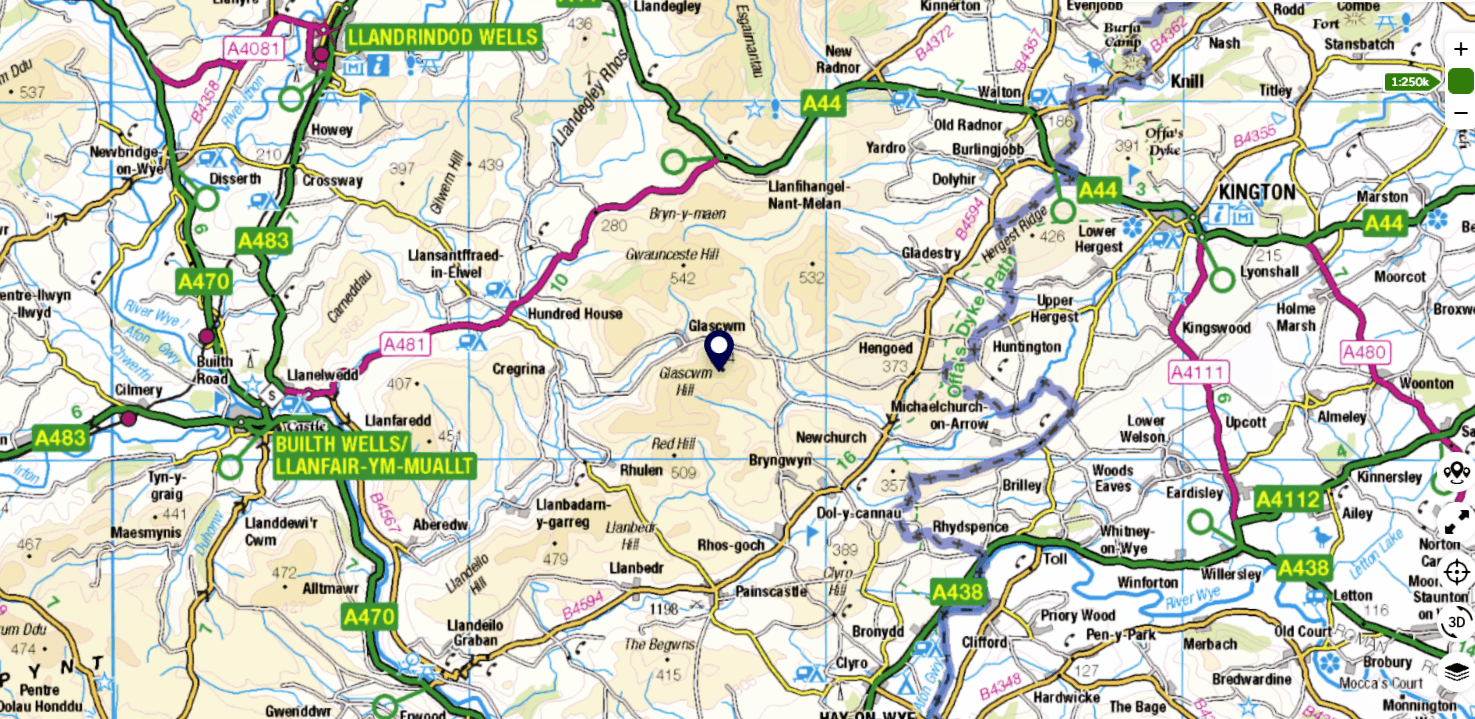
For reasons I didn’t query, the area is known as Ireland Moor. This contribution from the Ramblers confirms that and gives a little more information.
We’ll begin with establishing ownership of the land. And we start with a company called Ireland Moor Ltd (IM), registered in Jersey. Below is a clip from the Jersey companies registry.
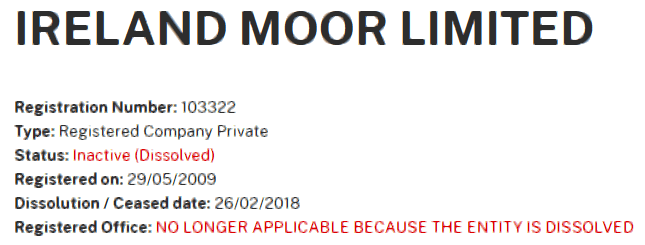
This company was wound up early in 2018, perhaps because it had been superseded by Ireland Moor Conservation Ltd (IMC), formed in July 2015. For more information, let’s turn to the new company.
The founding director was William Andrew Lewis Duff Gordon, and he was joined on June 6, 2016, by his three brothers. But Tom, the banker, left after just one day. He is with crypto outfit Coinbase.
Let’s turn to the charges for IMC, see who’s owed money.
I assume the first charge is for the purchase of Ireland Moor. The two creditors named are the Jersey-registered Ireland Moor Ltd, and Edward Warren Filmer. But if the land was owned by the Jersey company, does that mean the old company loaned the new company the money to buy the land?
UPDATE 16.10.2024: A comment to the blog tells me Filmer’s full name is Edward Warren Filmer Cabrera, and he’s linked with companies registered in Venezuela.
You’ll see four Land Registry title documents shown there, and here they are, in the order listed: WA484809 (no plan available), WA404806 (no plan available), WA667700 (with plan), and CYM427489 (with plan).
I’ve combined the two plans, but it leaves us with a problem.
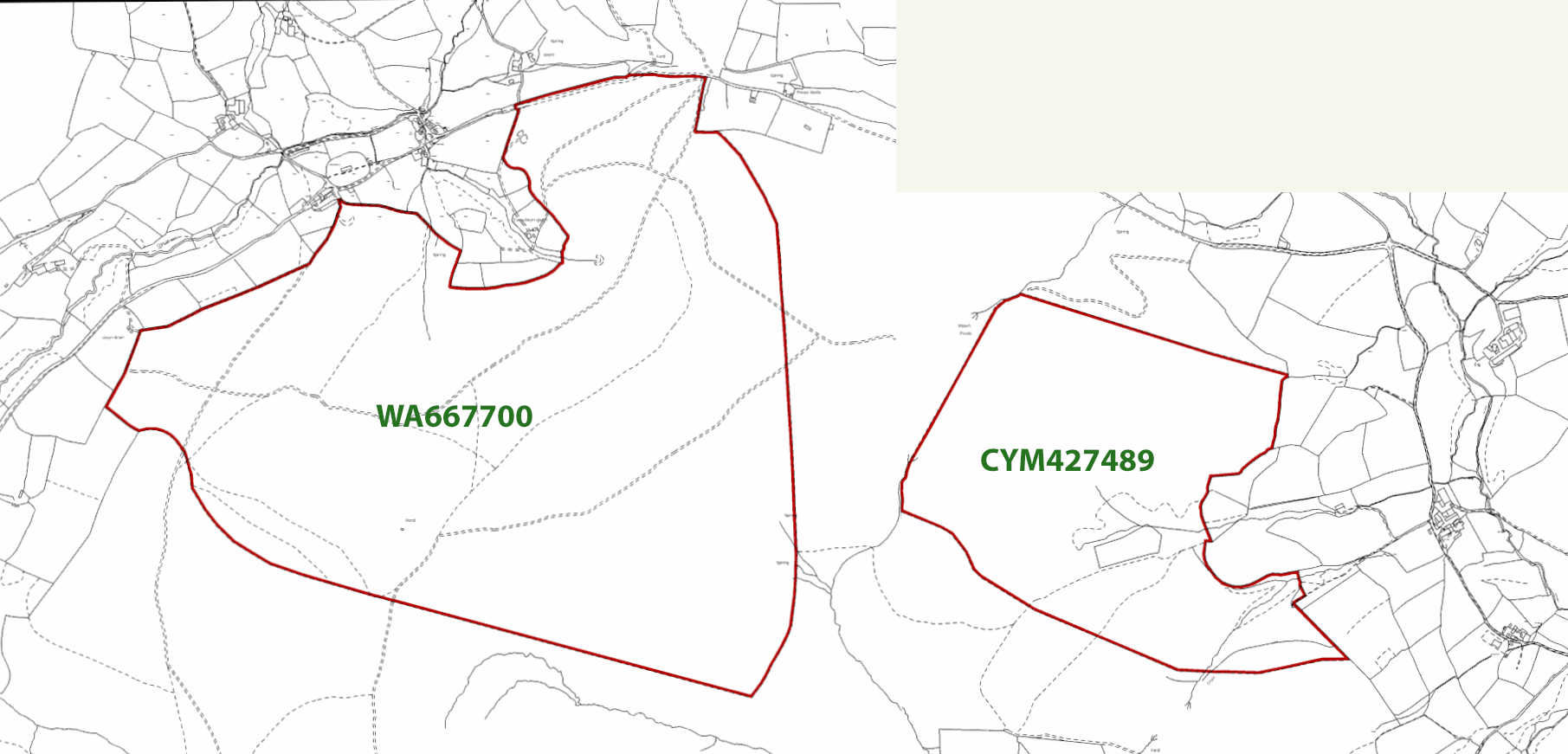
What we know is that the total price said to have been paid for the four titles was £1,160,000. (With £600,000 being mentioned as the buyer’s contribution in the legal charge.) But do these two plans cover the four titles, or are there plans missing?
Seeing as the Jersey registry tells us Ireland Moor Ltd is dissolved, then who now holds the debt against Ireland Moor Conservation Ltd? Has it all passed to the other name on the charge, Edward Warren Filmer?
The only company I can find with which Filmer’s involved is CGM Farming Ltd, formed in March 2015, just a few months before IMC.
Though ‘Farming’ is rather misleading, for this company’s in the business of, “Hunting, trapping and related service activities“. So I got to wondering about the name. Might the ‘GM’ stand for grouse moor(s)? And if so, what could the ‘C’ mean?
The Companies House filings give the address of an accountancy firm in Weybridge, Surry for CGM, but tell us Filmer lives in Wales.
There is another title mentioned on that first charge, under ‘Schedule 1’, page 16. This is against William Andrew Lewis Duff Gordon rather than the company.
Though the dates given in Schedule 1 do not tally with those given elsewhere. In fact, the dates given are before Ireland Moor Conservation Ltd was even formed! Something’s not right here.
It relates to “land lying to the south of Cwmpiben barn“. (Though I think that should read ‘Cwm-piban’.) It’s for a trifling £40,000. Here’s the title document and plan. And here it is pinned on the OS map. Not a million miles from Ireland Moor.
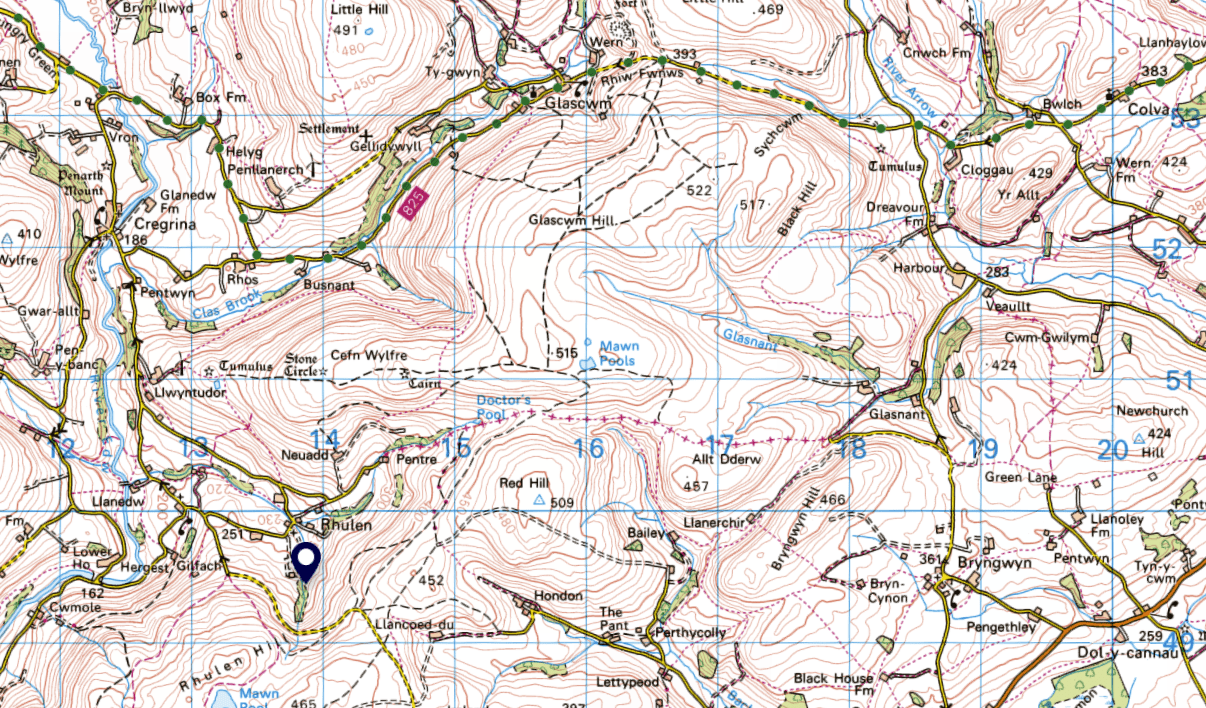
The other outstanding charges against Ireland Moor Conservation Ltd are, first, with Lloyds Bank (December 2016). Another with Lloyds (January 2017), secured against the 7000 acres at Ireland Moor. With a further charge with Lloyds against ‘Gwaithla bungalow’, at Gladestry.
◊
POWYS MOORLAND PARTNERSHIP
The problem relayed to me is that local farmer-graziers fear there are plans afoot that will adversely affect them, and this explains them being kept out of the loop.
Let’s start with the Powys Moorland Partnership (PMP). I was unable to establish when this outfit began life, but it visited Ireland Moor in September 2017. It’s funded by the ‘Welsh Government’ through the Sustainable Management Scheme.
Where we read . . .
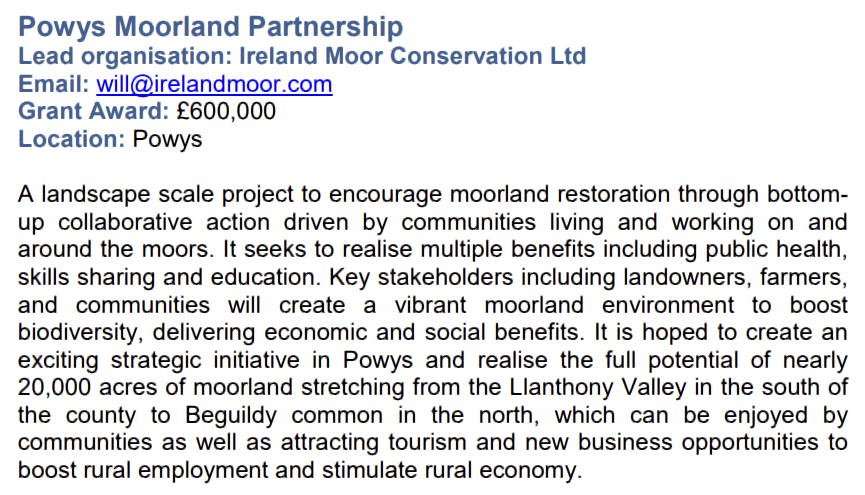
I’m sure you’ve clocked the £600,000. Is this the same sum we saw earlier, and which I assumed was the contribution made by Ireland Moor Environmental Ltd to the £1,160,000 purchase price of the four titles?
If so, then what I didn’t know then of course was the source of that money.
Though there’s also something odd about PMP. On it’s homepage it describes itself as a “3 year collaborative project“, but we know it’s been running for at least seven years. And in that mission statement there is no mention of the farmers who graze the land.

So who exactly are the partners in this ‘partnership’?
Also note that the capture above, from the Powys Moorland Partnership website, talks of: “. . . nearly 20,000 acres of moorland stretching from the Llanthony Valley in the south of the county to Beguildy common in the north . . . ”
Which is 43 miles by road, and not a lot less for a fit and adventurous crow. What’s more, Llanthony is not in “the south of the county“, it’s in Sir Fynwy (Monmouthshire).
If we’re talking about just 20,000 acres, over that distance, and we know that 7,000 are accounted for on the Black Hill and Glascwm Hill, then the other 13,000 must be scattered about in disparate parcels.
Though something I noticed about Llanthony on the OS map was the proximity of grouse butts. Is that what the Powys Moorland Partnership is all about?
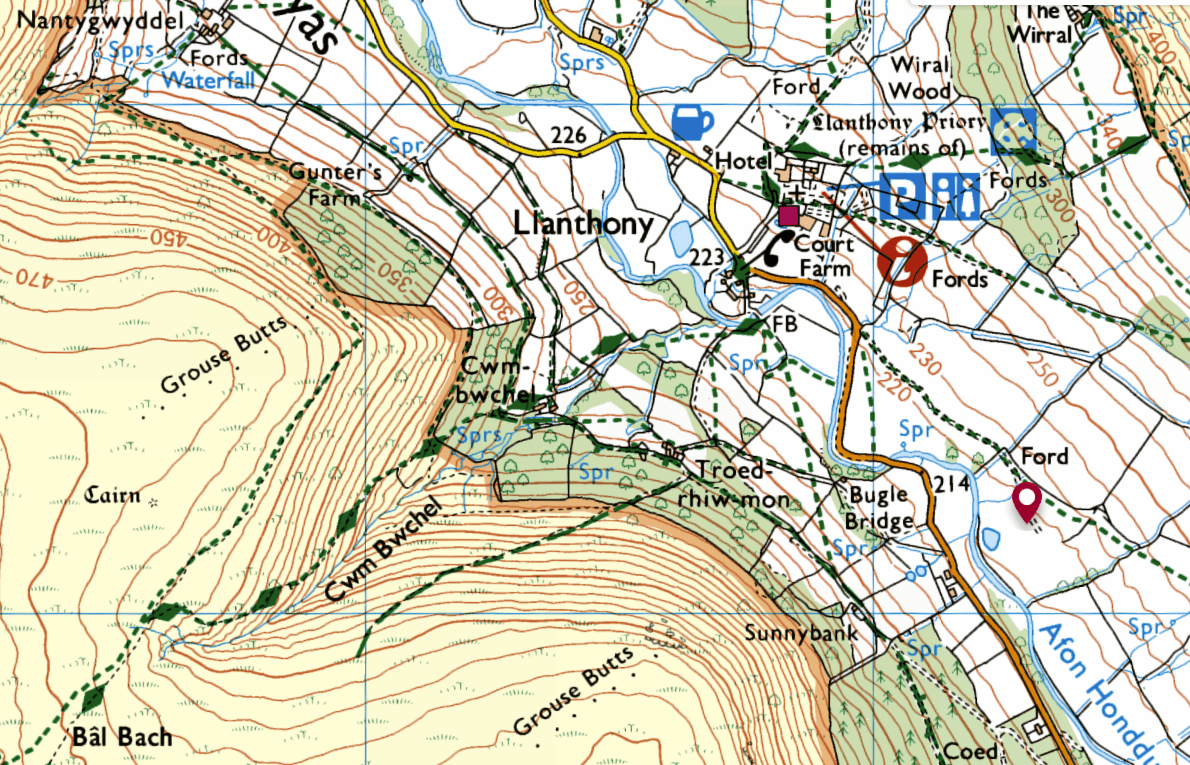
Maybe the ‘Welsh Government’, through the Sustainable Management Scheme, and more locally, the Powys Moorland Partnership, has accepted, even encouraged, some kind of alliance between local sporting interests and the environmental lobby.
The Crown Estate may also be involved. The map below, by Guy Shrubsole, was available through WalesOnline. It shows considerable Crown Estate holdings in the area.
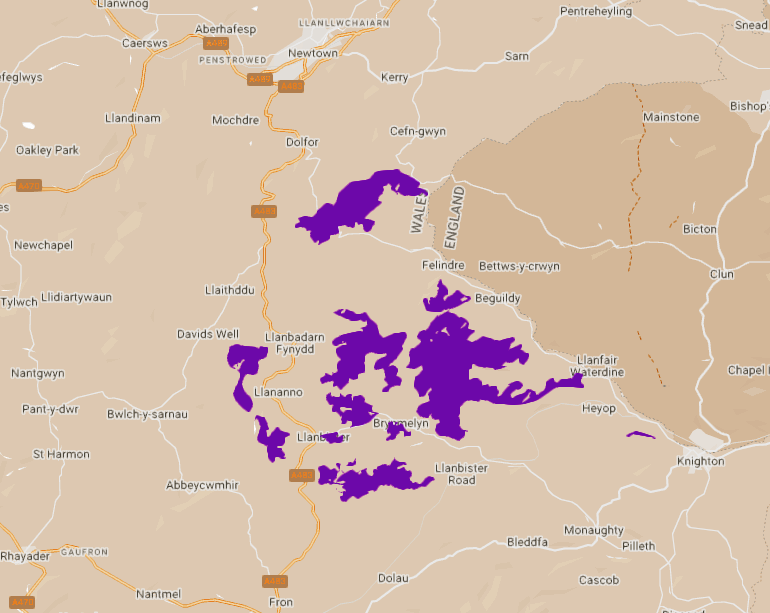
Quite a concentration in a small area. But it all makes sense.
Because it seems the PMP is little more than a vehicle for the Duff Gordons and their circle. Men like Peter Hood who rents the shooting rights on 5000-acre Beacon Hill from the Crown Estate.
Hood of course is one of those listed in the Powys Moorland Partnership’s ‘Who’s Who’, along with his gamekeeper David Thomas. Also there is Will Duff Gordon.
I believe the owners of the uplands we’ve looked at, including the Crown Estate and the Duff Gordons, have reached an understanding with the environmental lobby. The planet savers will turn a blind eye to the killing of grouse and the critters that prey on them to view the whole shebang through green-tinted glasses.
And of course, seeing as some farms might became unviable without their upland grazing the acquisitive interlopers of the local Radnorshire Wildlife Trust (RWT) look forward to more land becoming available.
The RWT has received £1,161,740 from the ‘Welsh Government’ in grants over the past 4 years. And it rises every year! Corruption Bay has no money for farmers, but plenty for those who put farmers out of business, and the scavengers who benefit.
◊
NATURAL CAPITAL
If we go back to the PMP website, we see a tab ‘Natural Capital’, so click on it. The opening paragraph reads:
The term ‘Natural Capital’ refers to the “stock of renewable and non-renewable natural resources (e.g. plants, animals, air, water, soils, minerals) that combine to yield a flow of benefits to people.” (Source: Natural Capital Protocol (2016).
Note the year, 2016. Which ties in perfectly with this document, prepared for the Fifth Assembly (2016 – 2021). Within it we find a contribution by Nia Seaton, asking. ‘Are we neglecting our natural capital?‘
I think it’s reasonable to assume the ‘Natural Capital’ bandwagon started rolling in Wales in or before 2015. Those ‘in the know’, those with contacts, would have had advance warning.
The natural capital report we’re looking at was prepared for PMP by environmental economist Phil Cryle, Duncan Royle, and Ian Dickie of Economics for the Environment Consultancy Ltd (eftec).
With the efforts of their labour reviewed by Dr Rob Tinch, also of eftec. Cosy!
Those involved clearly envision money being made available in the years ahead from exploiting ‘natural capital’. Yes, I know they want us to see it as conservation, but that’s no longer the motive.
The motive now is to put a price on, and thereby capitalise on, just about every square foot of heather, every cubic metre of soil. Even the air we breathe! And the payment won’t be a warm glow, it’ll be hard cash.
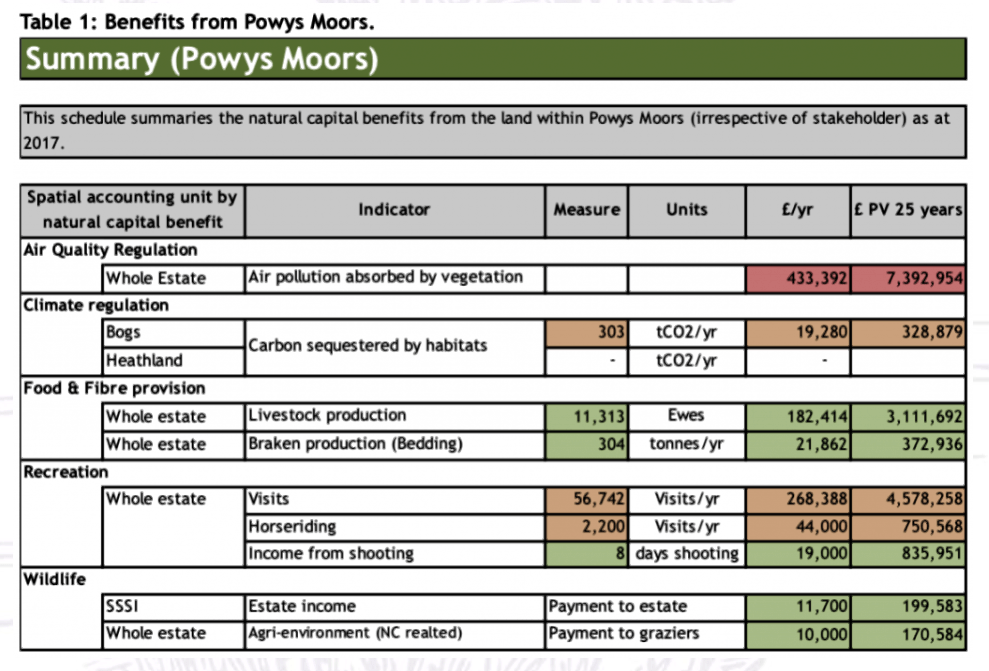
And I’m serious about the air we breathe. For as you can see, it’s projected to be a nice little earner in the years ahead.
◊
CONCLUSION
Yet again, we see politicians and others in Corruption Bay throwing money at anybody who can work the magic words ‘environment’, or ‘habitat’, or ‘conservation’, into their pitch for funding. Or into any other way of making money.
Which explains tax haven company Ireland Moor Ltd rebranding itself to Ireland Moor Conservation Ltd. For public money going to a Jersey-registered company would not look good.
The relationship between those two companies, and more especially the ownership of the original company, needs to be established. As does the identity and the role of Edward Filmer.
Because I couldn’t help but notice that the other projects funded by the Sustainable Management Scheme have as their ‘lead organisation’ a county council, a national park, a wildlife trust, or a Community Interest Company, but with Ireland Moor Conservation Ltd public funding was given to a private limited company with shares.
And those shares are divvied up within a very wealthy family.
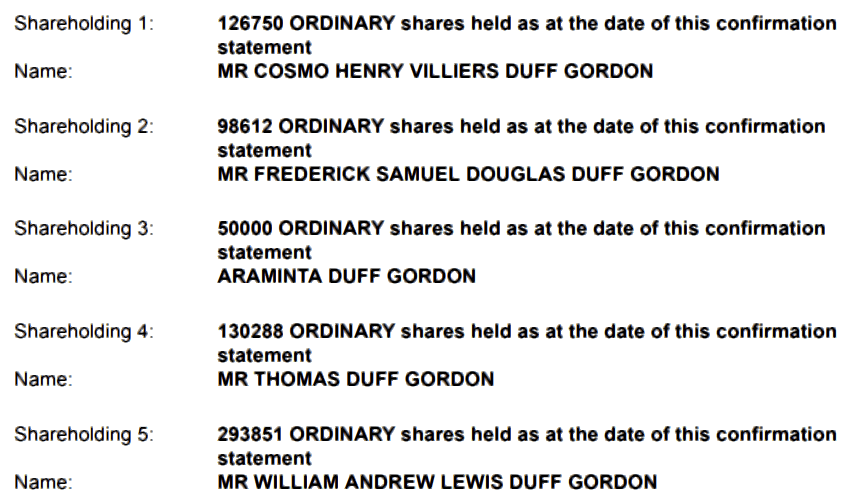
Discussions and planning by the Powys Moorland Partners (aka Ireland Moor Conservation Ltd), and certain other parties, seem to exclude the graziers.
You don’t need a crystal ball to see what’s happening here. And where it’s headed. Grouse shooting can be very profitable. And as we read earlier, the ‘Welsh Government’ is already funding gamekeeper jobs via the PMP.
Finally, let’s not forget natural capital, which can be greatly enhanced by activities such as planting trees. Or, to put it crudely, greenwashing. I’m told Aviva, partner to WWF, has been spoken of favourably, and more than once, by the Duff Gordons.
The graziers are being sold out; they and their sheep are in the way . . . and getting rid of them dovetails perfectly with the ‘Welsh Government’s desire to end livestock farming.
♦ end ♦
© Royston Jones 2024


